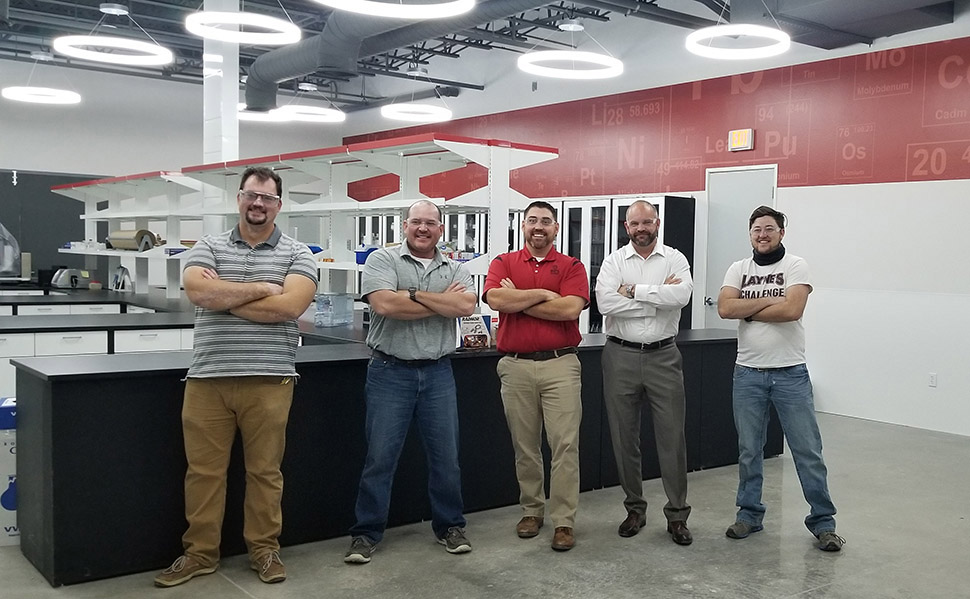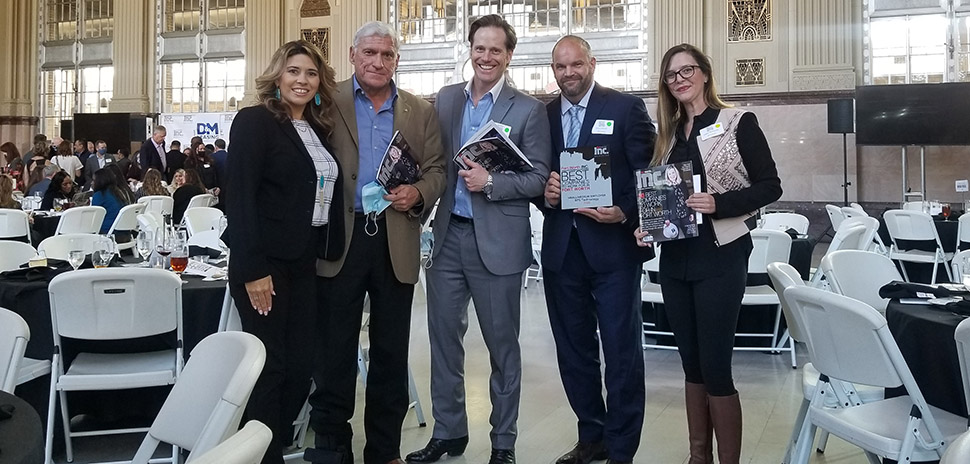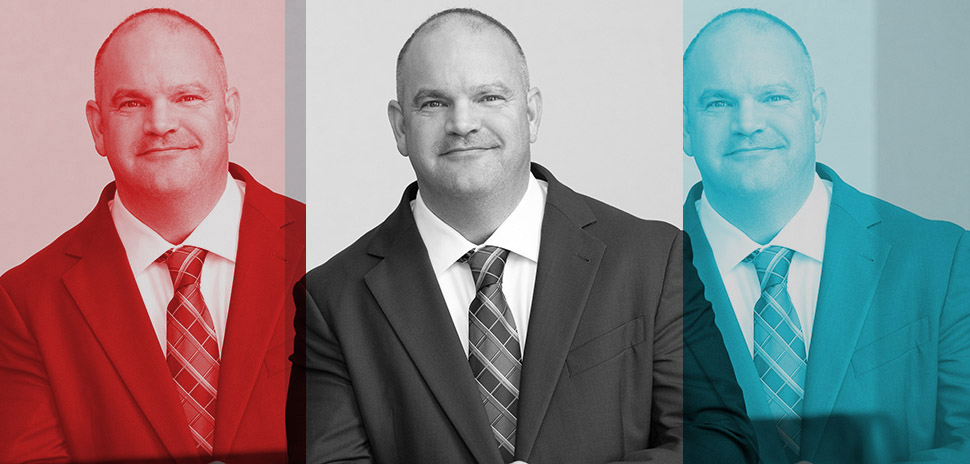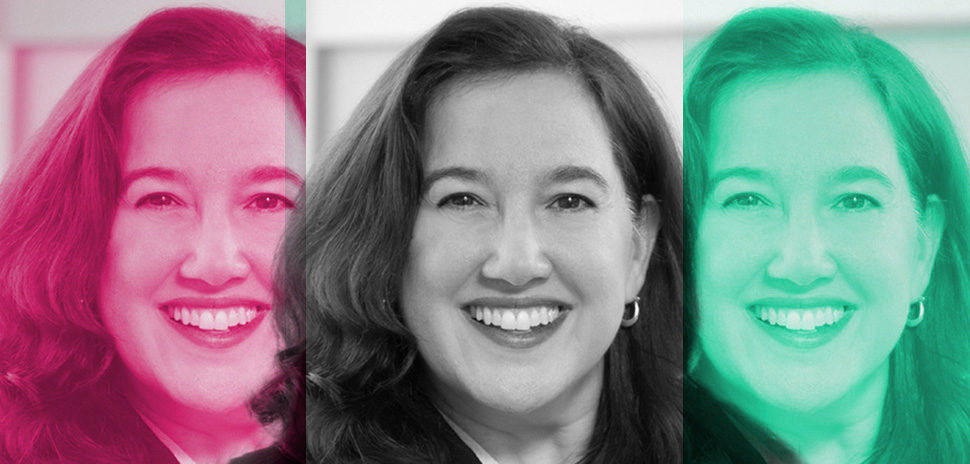Bravis Brown and his team at BPS Technology are improving agricultural production and the environment through sustainable chemical innovations. With a dozen patents filed in the last 12 months—all powered by a water-based technology called SymMAX—the company’s invention is moving at a fast clip.
STARTUP
Chemical Impact
Bravis Brown
“There are companies three times our size that would call it a win if they filed one patent per year,” says Brown who helms the company as CEO.
The technology is a scientific advancement that could have a “tremendous impact on how we care for and feed a rapidly growing population in a sustainable way,” he told Dallas Innovates. It also offers applications for the energy industry, as well as nearly any company or industry.
Brown calls SymMAX a “first-of-its-kind host chemistry.” That means the agent can enhance almost any chemical or biological solution it’s mixed with, he explains. Because of the “potentially endless” use cases for SymMAX technologies, Brown sees it scaling at a rapid pace.
That versatility is also a challenge. Brown zeros in on where the chemistry can have the greatest impact with a rigorous due-diligence process.
“We’ve really been able to turn on that engine on this past year,” the CEO says.
“Innovations over the last year span oil and gas recovery enhancers to specialty formulas for horticulture—all powered by the SymMAX technology,” he says.
One new enhancer allows greenhouse growers to cut their fertilizer by 50 percent. The technology can also improve soil health, Brown says.
SymMAX, which uses naturally occurring minerals, works by forming “supramolecular structures” as it’s added to a chemical solution. The additive works better or lasts longer than other solutions available today, he says.
Brown views innovation as the intersection of product enhancement, environmental stewardship, and economic value.
The new SymMAX technology is a prime example of that triangulation of innovation: “It hits on all three of those areas,” he says. The water-based additive increases the effectiveness of fertilizers at lower levels, reduces the impact on soil and groundwater, and improves a farmer’s bottom line.
BPS name change reflects expansion
BPS launched in 2014 with a focus on mechanical technology to treat water without using chemicals in the oil and gas industry. Since then, BPS has expanded to creating technology—chemical and mechanical—in other industries such as agriculture, water treatment, and life sciences, per the Cross Timbers Gazette.
The BPS Technology name has evolved to reflect that. Formerly known as BPS Jet and BPS Just Energy Technology, the new moniker underscores the company’s expansion beyond the energy sector since the company’s launch in 2014.
What hasn’t changed is the sustainability and core values (Just and Fair) at the core of its innovation, the company says.
Multiple brands = targeted solutions
BPS Technology is essentially an intellectual property holding company, Brown explains. The company, which is privately held, develops and commercializes its innovations with patents and trademarks on both chemical and mechanical properties.
BPS, which is primarily supported by private investors, has a core group of founders that have stayed engaged, Brown said in a recent podcast interview. They are believers in the technology and its “chemical-mechanical approach” using BPS’ innovative process for development, he says.
Brown and his team identify opportunities to build out a line of business in an industry segment, he says. Through its family of companies, BPS Technology is able to tailor its solutions to solve pain points in market sectors like agriculture and energy. In the case of agriculture, the company has pinpointed segments within the Ag space, launching vertical businesses to develop products dedicated to supporting those segments from farmland crops to greenhouse environments.
The company’s operations portfolio includes Shotwell, BPS Oil & Gas, and BPS Agriculture. CEO Brown calls it a family of companies.

Within the chemical manufacturing arm, Shotwell, BPS serves the household, industrial, and institutional cleaning sector. BPS Oil & Gas provides solutions for the three major industry sectors: upstream, midstream, and downstream companies. BPS Agriculture is made up of three operating entities focused on various needs of growers and farmers: Verano365 (horticulture), Farm Shield (crop protection), and PureAcre (crop nutrient management).
PureAcre emerged from stealth in 2020.
How process innovation lets BPS focus efforts on the greatest impacts
With multiple brands and a product with broad applications across industries, focus is important, Brown says. The company determines commercial viability through business development and product development. Its process creates something of a playbook, according to Brown.
Brown credits the company’s lab with the development of an exacting due-diligence method called “Chemical Integration Plan.” Dr. Robert Geiger, who runs the lab, and his team created the system last year to test SymMAX and other compounds to see where they show the most active chemistries for the greatest impact. The findings point to where BPS can best focus its efforts.

Bravis Brown (second from right) and the team in the lab.
That process innovation has translated into two new products that are being prepped for launch. One is an oil–and–gas–industry product created to remediate the toxic hydrogen sulfide found in oilfield operations. The other is a proprietary nutrient management product for agriculture that can help with fertilizer efficiency.
Both products address critical issues in their industry segments, says Brown, who was a finalist in the D CEO and Dallas Innovates 2021 Innovation Awards in the manufacturing and consumer goods category.
The process creates something of a step-and-repeat as the SymMAX technology is applied to new challenges in other sectors, potentially speeding a rollout of developments for the company.
What’s next for BPS Technology?
With the increase in patent activity in 2020, it is looking for licensing opportunities to further develop its IP. It’s also rapidly commercializing its developments. The company is eyeing several new product launches across various industries, Brown says.
In agriculture, new products will apply to greenhouse growers, row crop commodity farmers, and specialty growers, and includes a line of enhanced nutritionals and biostimulants, Brown says.
In the oil and gas industry, BPS is wrapping up field trials on a new product that remediates highly toxic hydrogen sulfide found in oilfield operations. The formulation BPS has created is more effective and longer-lasting than what’s on the market today, according to Brown. Seeing it work in the field for customers is exciting, he says.
Slated for a full-scale launch, the new development enhances the efficacy of MEA triazine, commonly known as a hydrogen sulfide scavenger, or H2S, which is used in the treatment of sour oil and gas.
Preparing for growth
In addition to growing product portfolios across its operating entities, BPS is also planning for growth as a company.
Brown calls the company’s new headquarters in Argyle a showcase setup, complete with an innovation discovery center inside.
The company’s team and capabilities have grown, the CEO says. After six years in Southlake, where the company leased space, BPS needed a bigger footprint. BPS moved to the new campus in November.
The new digs house 35 employees and include space for up to 85, BPS says.
Conservatively, Brown projects hiring about 10 people over the next 12 to 18 months.
“Between our new campus, new industry penetration, and increasing market share with our current entities, we’ll need to identify top-tier talent to help meet our goals,” he says.
Talent is the infrastructure to support BPS’ next phase
Brown looks for folks who can “do better than me,” he says. And assembling a team that can carry out the vision of multiple brands is key to the the company’s success.
“Location, location, location” is one of the key components to attract talent, especially when we try to relocate top talent from around the country, the CEO said in a recent interview with the Dallas-Fort Worth Business Podcast.
Brown says families outside of Texas can see opportunities for employment, which means there are plenty of job opportunities for a spouse, too.
North Texas, in general, is helpful for growth-stage companies: “Because of the diversity of industries in North Texas, the economic climate in Texas in general, and the type of talent we can recruit to the area because of our quality of life, we’re in a prime spot for cultivating innovation,” Brown told D CEO last year.
The CEO, who relocated to the region in 2007, came to the area “because we believe all those things,” he added.
In laying the groundwork for the next phase of BPS’ growth, the CEO expanded the executive team with two leadership appointments in December. He expects the moves to bolster the company’s traction in product development and licensing. Baron Lukas, previously Chief Governance officer, was named president of BPS Technology and Cindy Peters joins as VP of Operations.
In May, Brown hired new CFO Erik Cooper who will spearhead capital raises for BPS operating entities. In addition to a tech and ag background, Brown commented that his character and integrity make him a match for the company culture.

BPS ranked No. 2 in Fort Worth Inc.’s 2020 Best Companies to Work For in Fort Worth last year.
Values in action
Brown, who considers himself a generalist, takes a broad view of the business. He sees success in empowering people to have ownership in their job while providing support as needed. The CEO, a former United States Marine, takes a servant-leadership approach to running the company, which is built around faith-based principles—specifically, Proverbs 21:3.
Brown boils it down to “doing what is right and just.”
But “just” doesn’t mean “only” in the company’s vernacular: It’s more a calling to use its technological advances in a way that leaves the world a better place, according to the company’s website.
It’s a notion that underscores all of the innovations that the team develops.
Brown, who’s been described as both humble and relatable, is known for “walking the talk” of servant leadership in the values-based company.
It’s not just lip service: Brown was caught on camera delivering a breakfast care package to a BPS employee and her family fighting COVID-19. That makes “it resoundingly clear for our people that values are more than just words to our leaders,” shared John Wagler, husband of BPS’ Kailan Wagler, in a social post.
But, says Brown, “what makes our people truly driven is a sense of mission to advance our technology—we all know that what we’re working on is revolutionary, and we’re the only company in the world that can do it.”
That purpose “makes each person on our team feel uniquely responsible and guided to succeed,” the CEO says.
Meet the CEO
![CEO Bravis Brown [Photo: BPS Technologies]](https://s24806.pcdn.co/wp-content/uploads/2021/03/Bravis-Brown_BPS.jpg)
CEO Bravis Brown [Photo: BPS Technology]
Bravis Brown was featured in Dallas Innovates’ Future 50 in Dallas-Fort Worth in the 2021 edition of our annual magazine. We talk with the CEO about innovation, the impact of COVID-19, and his outlook for this year. Here’s a takeaway:
On the company’s biggest innovation from the last year:
It’s hard to pick just one, but we’ve been able to file 12 patents in the course of the last 12 months, which is an incredible accomplishment that we’ve been working towards for quite some time. Our aqueous-based host chemistry, SymMAX, can be blended with any active chemical ingredient. That versatility allows for an incredible opportunity. It also requires focus, which is why we developed a strategic Chemical Integration Plan. With some chemicals, we see that SymMAX can move the efficiency needle by triple-digit percentages, and with others we see it move by single-digit percentage points. By developing a methodical due-diligence process, we can zero in on active chemistries where SymMAX has the greatest impact. We’ve really been able to turn that engine on this past year.
Tangibly, that means we’ve been able to file patents on oil and gas and agricultural chemical innovations that incorporate SymMAX over the course of 2020. In previous years, we spent a lot of time gaining an understanding of potential applications, strategic planning, and what would set us up for a successful patent process.
On how the company is helping to increase crop yield in agriculture:
A great example of how SymMAX can change the future can be illustrated with a new product we’re developing in agriculture. Imagine a farmer being able to increase the uptake and utilization of applied nutrients by more than 200 percent. We’ve developed a proprietary nutrient management product that can help with fertilizer efficiency. Our formula allows a standard fertilizer to be used at half the rate, while still producing a successful crop.
Fertilizer-use efficiency has long been an issue in agriculture, and growers spend a lot of time and resources on soil fertility management and crop nutrition. Today’s elite corn hybrids have the genetic capability to produce more than 600 bushels per acre, yet the average in the U.S. is less than 200 bushels per acre. Today, less than 30 percent of applied phosphorus is available to be utilized by the crop. We can solve that.
In our lab studies, by achieving an up to 250 percent increase in nutrient assimilation with the product, plant mass would increase up to 52 percent. When you extrapolate these numbers, this breakthrough could realize an additional 15 billion bushels from farms across the U.S. with fewer pollutants in the environment.
On the potential of SymMAX in other industries:
Our advanced technology creates supramolecular structures with chemical and biological molecules of any size. Our goal has always been to focus our development on where we can see significant improvements in a chemical’s performance in terms of the environment and economics. Whether it’s in advancements for broadacre crops, horticulture operations like greenhouses, or in oilfield applications, SymMAX has implications to overall economic success, water quality, and long-term sustainability across myriad industries.
On diversifying BPS Technology beyond its primary pillars in the pandemic:
When we entered 2020, our plan was to continuously introduce BPS Technology’s signature proprietary technology, SymMAX, to new industries and market segments in chemical manufacturing. In short, COVID-19 accelerated our growth strategy and necessitated a few pivots in our plan—which I’m sure a lot of businesses can relate to during 2020.
At the beginning of the year, one of the primary pillars of our BPS Technology family of companies, was aligned to Upstream oil and gas. But as the coronavirus pandemic took hold in March, we saw oilfield crews across the Permian Basin disband and the price of oil bottom out, accelerating our need to enter new industries and launch products. We did this in a number of ways over the course of a very short time.
One of the first things we did was enter a new industry by producing high-quality hand sanitizers. We saw a demand spike for consistent, CDC-recommended hand sanitizers. Given the asset we have in Shotwell, a state-of-the-art chemical manufacturing facility [manufacturing SymMAX in Midland], we knew that we could help meet some of that need and expand the firm’s business.
Our team went from ideation to commercialization in just two short weeks. We were able to meet FDA regulatory guidelines, secure a supply chain, and produce FDA-registered formulations for both isopropyl alcohol and ethyl alcohol gel and liquid sanitizers. [Ed. note: The company donated some 40,000 bottles of hand sanitizer in Texas communities.]
Once that was up and running, we diversified our energy business by establishing BPS Oil & Gas to begin bringing innovations to the Midstream and Downstream segments of the industry. Now, with the price of oil continuing to steady out, BPS Oil & Gas has introduced our proprietary technology to companies across the energy production spectrum as well as introduce new products applicable from upstream to downstream applications.
On segmenting in the Ag space to help meet demand for food security:
The COVID-19 crisis also spotlighted the increased global need for food security; growers and farmers around the globe are looking for ways to operate more efficiently in an environmentally conscious way while meeting growing global demand. Since March, we’ve established BPS Agriculture as a portfolio of companies, including Verano365, Farm Shield, and PureAcre.
In November, it was announced that BPS Agriculture made the finalist list for Rabobank’s virtual FoodBytes! Pitch 2020 international food and ag startup discovery competition. The team competed in the Ag Tech segment, which highlighted startups solving soil and water sustainability and farm efficiency.
BPS Agriculture was among 45 companies invited to participate in FoodBytes! Pitch 2020 from a field of nearly 340 applicants from around the globe. The team highlighted BPS Agriculture’s ability to increase crop yields and reduce chemical usage without negatively impacting farmers’ bottom lines or sacrificing soil and water health.
BPS was among the 15 finalists participating in a live-streamed pitch competition on December 2.
On how company culture is the BPS “North Star”:
While the coronavirus pandemic has presented challenges and opportunities, our company culture has been a North Star through the peaks and valleys of the last year. The bright spot during all of this has been seeing the team gel to move at a rapid pace.
The company’s culture is rooted in our core values: Strategic, Servant Minded, Shepherds, Stewardship, Steadfast, and Spiritual. We can foster resilience if we help our people with work-life integration, empowering servant leadership at all levels, and being mission driven.
From Memorial Day through Labor Day, we provided half-day Fridays allowing our employees to spend more time with family and friends, with what amounts to an additional seven days of PTO for the year. As part of our #SERVE corporate citizenship program, our people have helped donate more than 40,000 bottles of our hand sanitizer to more than 60 different organizations across Texas. We also provide Volunteer Time Off for employees to serve causes of their choice as well.
The story with updated on March 3, 2021, with additional photos. A version was originally published in Dallas Innovates 2021: The Resilience Issue.
Read it online
Our fourth annual magazine, Dallas Innovates 2021: The Resilience Issue, highlights Dallas-Fort Worth as a hub for innovation. The collective strength of the innovation ecosystem and intellectual capital in Dallas-Fort Worth is a force to be reckoned with.
![]()
Get on the list.
Dallas Innovates, every day.
Sign up to keep your eye on what’s new and next in Dallas-Fort Worth, every day.


































































